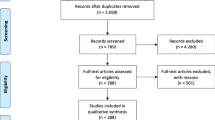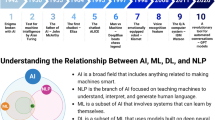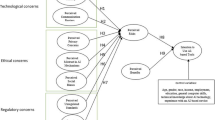Abstract
As a style of information processing, intuition involves implicit perceptual and cognitive processes that can be quickly and automatically executed without conscious mental will, such that people know more than they can describe. Patient intuition can influence patient and clinician decision-making and behavior. However, physicians may not always see patient intuition as credible or important, and its management in the clinical setting is poorly understood. This paper takes a step toward suggesting conditions under which patient intuition should be taken seriously. These conditions relate to the credibility or accuracy of the intuitive beliefs held by the patient, and their significance to the patient. Credibility may be increased when the intuitions of patients (1) reflect their individualized knowledge, (2) can complement the common absence of scientific evidence in managing health problems, and (3) can quickly and effectively process key information in complex cognitive tasks. Even intuitions that lack credibility can be subjectively rational and meaningful to patients, and help to shape the decisions they and clinicians make.
Similar content being viewed by others
References
Isenman L. Toward an understanding of intuition and its importance in scientific endeavour. Persp Biol Med. 1997;40(3):395–403.
Evans J. Dual-processing accounts of reasoning, judgment and social cognition. Ann Rev Psychol. 2008;59:255–78.
Polanyi M. The tacit dimension. Garden City, New York: Doubleday; 1967.
Hall E, Cooper A, Watter S, Humphreys K. The role of differential diagnoses in self-triage decision-making. Appl Psychol: Health Well-Being. 2010;2(1):35–51.
Zhenhua Y. Tacit knowledge/knowing and the problem of articulation. Tradition & Discovery. Polanyi Soc Period. 2003-4;30(2):11–23.
Klein G. Intuition at work. New York: Bantem Dell; 2003.
Butchel E, Norenzayan A. Which should you use, intuition or logic? Cultural differences in injunctive norms about reasoning. Asian J Soc Psychol. 2008;11(4):264–73.
Redelmeier DA, Schull MJ, Hux JE, Tu JV, Ferris LE. Problems for clinical judgment: 1. Eliciting an insightful history of present illness. Can Med Assoc J. 2001;164(5):647–51.
Hall K. Reviewing intuitive decision-making and uncertainty: the implications for medical education. Med Educ. 2002;36(3):216–24.
Haynes R, Devereaux P, Guyatt G. Clinical expertise in the era of evidence-based medicine and patient choice. ACP J Club. 2002;136:A11–4.
Henry S. Recognising tacit knowledge in medical epistemology. Theor Med Bioeth. 2006;27(3):187–213.
Tracey C, Dantas G, Upshur R. Evidence-based medicine in primary care: qualitative study of family physicians. BMC Fam Pract. 2003;4(6). Accessed on October 26, 2010 at: http://www.biomedcentral.com/1471-2296/4/6.
Groopman J. Second Opinions. Stories of Intuition and Choice in the Changing World of Medicine. New York: Penguin; 2000.
Chandra A, Lindsell C, Limkakeng A, et al. Emergency physician high pretest probability for acute coronary syndrome correlates with adverse cardiovascular outcomes. Acad Emerg Med. 2009;16(8):740–8.
King L, Appleton J. Intuition: a critical review of the research and rhetoric. J Adv Nurs. 1997;26(1):194–202.
Magin P, Adams J, Joy E, Ireland M, Heaney S, Darab S. General practitioners' assessment of risk of violence in their practice: results from a qualitative study. J Eval Clin Pract. 2008;14(3):385–90.
Broadbent E. Illness perceptions and health: Innovations and clinical applications. Soc Pers Psychol Compass. 2010;4(4):256–66.
Norman G, Eva K. Diagnostic error and clinical reasoning. Med Educ. 2010;44(1):94–100.
Gilovich T, Griffin D, Kahneman D, eds. Heuristics and Biases: The Psychology of Intuitive Judgment. Cambridge: Cambridge University Press; 2002.
Pescosolido B. Beyond rational choice: the social dynamics of how people seek help. Am J Sociol. 1992;97(4):1096–138.
Lieberman M. Intuition: A social cognitive neuroscience approach. Psychol Bull. 2000;126(1):109–37.
Sinclair M, Ashkanasy N. Intuition: Myth or a decision making tool? Manag Learning. 2005;36(3):353–70.
Lieberman M. Social cognitive neuroscience: A review of core processes. Ann Rev Psychol. 2007;58:259–89.
Greenhalgh T. Intuition and evidence—uneasy bedfellows? Br J Gen Pract. 2002;52(478):395–400.
Dane E, Pratt M. Exploring intuition and its role in managerial decision making. Acad Manag Rev. 2007;32(1):33–54.
Hogarth R. Educating Intuition. Chicago: University of Chicago Press; 2001.
Molina M, Isoardi R, Prado M, Bentolila S. Basal cerebral glucose distribution in long-term post-traumatic stress disorder. World J Biol Psychiat. 2010;11:493–501.
Dorfman J, Shames V, Kihlstrom J. Intuition, incubation, and insight: Implicit cognition in problem solving. In: Underwood G, ed. Implicit cognition. Oxford University Press; 1996.
Jones D, Gill P. Refugees and primary care: tackling the inequalities. BMJ. 1998;317(7170):1444–6.
Buetow S. Something in nothing: Negative space in the clinician-patient relationship. Ann Fam Med. 2009;7(1):80–3.
Norman G, Young M, Brooks L. Non-analytical models of clinical reasoning: the role of experience. Med Educ. 2007;41(12):1140–5.
Ellis J, Mulligan I, Rowe J, Sackett DL. Inpatient general medicine is evidence based. Lancet. 1995;346(8972):407–9.
Gill P, Dowell A, Neal R, Smith N, Heywood P, Wilson A. Evidence based general practice: a retrospective study of interventions in one training practice. BMJ. 1996;312(7034):819–21.
Kahneman D, Klein G. Conditions for intuitive expertise: a failure to disagree. Am Psychol. 2009;64(6):515–26.
Upshur REG. Seven characteristics of medical evidence. J Eval Clin Pract. 2000;6(2):93–7.
Ioannidis J. Why most published research findings are false. PLoS Med. 2005;2(8): e124. Accessed on October 26, 2010 at: http://www.plosmedicine.org/article/info:doi/10.1371/journal.pmed.0020124.
Straus S. Individualizing treatment decisions. Eval Health Profess. 2002;25(2):210–24.
Boudon R. The ‘Cognitivist Model’: A Generalized ‘Rational-choice model’. Rational Soc. 1996;8(2):125–50.
Leventhal H, Meyer D, Nerenz D. The common sense representation of illness danger. In: Rachman S, ed. Med Psychol. New York: Pergamon; 1980:7–30.
Redelmeier D, Rozin P, Kahneman D. Understanding patients’ decisions. Cognitive and emotional perspectives. JAMA. 1993;270(1):72–6.
Wright E. On intuitional stability: The clear, the strong, and the paradigmatic. Cognition. 2010;115(3):491–503.
Buetow S, Henshaw J, Bryant L, O’Sullivan D. Medication timing errors for Parkinson’s Disease: Perspectives held by caregivers and people with Parkinson’s in New Zealand. Park Dis. 2010. Accessed on October 26, 2010 at: http://downloads.sage-hindawi.com/journals/pd/2010/432983.pdf.
Segalowitz S. Knowing before we know: Conscious versus preconscious top-down processing and a neuroscience of intuition. Brain Cognition. 2007;65(2):143–4.
James W. What is an emotion? Mind. 1884;9(34):188–205.
Thayer J, Brosschot J. Psychosomatics and psychopathology: looking up and down from the brain. Psychoneuroendocrinology. 2005;30(10):1050–8.
Brosschot J, Gerin W, Thayer J. The perseverative cognition hypothesis: A review of worry, prolonged stress-related physiological activation, and health. J Psychosom Res. 2006;60(2):113–24.
Broadbent E, Ellis C, Thomas J, Gamble G, Petrie K. Further development of an illness perception intervention for myocardial infarction patients: A randomized controlled trial. J Psychosom Res. 2009;67(1):17–23.
Financial disclosure
None.
Conflict of Interest
None disclosed.
Author information
Authors and Affiliations
Corresponding author
Rights and permissions
About this article
Cite this article
Buetow, S.A., Mintoft, B. When Should Patient Intuition be Taken Seriously?. J GEN INTERN MED 26, 433–436 (2011). https://doi.org/10.1007/s11606-010-1576-6
Received:
Revised:
Accepted:
Published:
Issue Date:
DOI: https://doi.org/10.1007/s11606-010-1576-6




